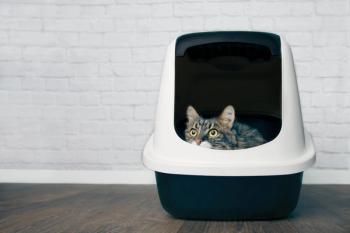
When it comes to heartworms, cats may be overlooked but they’re certainly not immune. Here’s what you need to know about feline heartworm disease.

When it comes to heartworms, cats may be overlooked but they’re certainly not immune. Here’s what you need to know about feline heartworm disease.

Testing by the USDA confirms that this the first case of the virus in a pet dog in the U.S.

The breakroom in your hospital can serve multiple functions, all of which lead to a more productive and enthusiastic veterinary team.

Here are some tips to help your veterinary team cut back on overtime.

COVID-19 has tested our skills and forced veterinary practice owners, associates and teams out of our comfort zones in many ways. It has also taught us some important lessons along the way.

Although it has been effective in raising pet adoption rates, one veterinarian thinks this marketing campaign has a dark side. Here is what she proposes instead.

There may be disagreement about the reasons why relatively few minorities join the veterinary profession, but we all agree that increasing diversity and inclusion should be a priority.

This succinct review of equine internal parasite control measures reflects modern strategies now in place to reduce development of resistance.

If immune-mediated hemolytic anemia makes you crazy, you are not alone. Here’s the lowdown on diagnosing this confounding disease.

Hint: It’s not a one-size-fits-all approach.

COVID-19 is turning the veterinary industry on its head, with effects that are both positive and negative.

Identifying IBD is often a challenge, but the recent discovery of serum-based markers for canine IBD may make diagnosing this disease in dogs quicker, cheaper and less invasive.

Following its worldwide survey of mental health and wellbeing in the veterinary profession, WSAVA vows to take steps to advance the health and welfare of veterinary teams around the world.

Causes of feline diarrhea range from simple infection to cancer. By characterizing the diarrhea and running simple tests, the practitioner can identify the pathology and stop the mess.

A three-time veterinary school dean, Dr. Glen Hoffsis has had a major impact on both veterinary education and public policy.

As shelter-in-place restrictions are lifted throughout the country, the full impact of the pandemic shutdown will come into clearer focus. Here are four major challenges veterinary practices can expect—and how to handle them.

Summer is just about here, and so are the mosquitoes. Here’s why—and how—to talk to your clients about heartworm disease prevention in cats.

How to turn the threat of online pharmacies into opportunities for your practice.

Veterinary ophthalmologist Dr. Ron Ofri shares a few tips to help in diagnosing blindness in your veterinary patients.

Euthanasia should be a gentle death, but when it’s not—for whatever reason—it is incumbent on veterinary teams to address the situation with their clients and themselves.

Matters of the heart can get tricky. That’s why we’ve developed a host of tools to help you get a handle on heartworm disease in dogs and cats. (With an educational grant provided by Bayer)

Your clients might question the need for annual heartworm testing if their dog has been on a preventive throughout the year. Now you can give them the answers easily.

Give your clients the facts about the damage heartworm disease can do not only to their pet’s health but also to their pocketbook.

Heartworm disease prevention and annual testing are a must for dogs and cats across the United States, says Dr. Stephen Jones. Here’s why.

A veterinary practice manager and consultant shares from personal experience why some team members are disengaged—and what to do about it.

Why cats shouldn’t be overlooked when it comes to routine heartworm testing.

Answers from experts to the COVID-19 questions on every veterinary professional’s mind.

Nutritional information is a key part of a veterinary patient’s history and crucial to good medical case management, yet this information can be elusive. According to the results of a new study, how you phrase your question can make all the difference between an ample answer and a lean response.

With so many practices turning to telemedicine during the COVID-19 pandemic, experts share what it really means—and some key benefits of incorporating telehealth into veterinary practice.

The Independent Veterinary Practitioners Association was founded for a single reason: to help independent veterinary businesses thrive in an era of corporate consolidation.